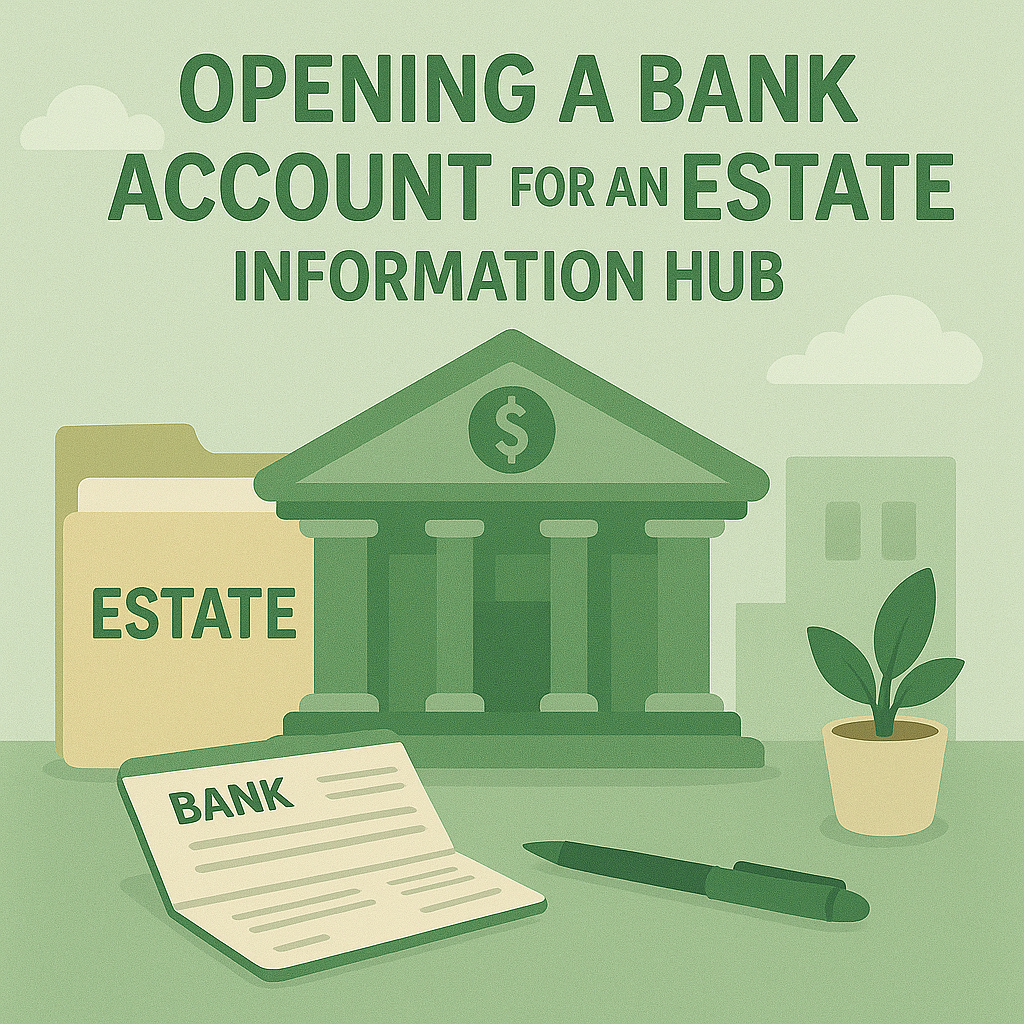Opening an Estate Account the Right Way
The Opening A Bank Account For An Estate Information Hub
When someone dies, their accounts can’t be touched until the estate is properly set up. Opening a dedicated estate account ensures bills are paid, money is tracked, and everything flows through one clean channel. This hub covers what it is, why it matters, and how to open one without losing your mind.

Key Things To Know
Before you head to the bank, here are the most important things to understand about how estate accounts work and what you’ll need to set one up properly.
- What is an estate account?: An estate account is a special bank account opened by the executor or personal representative of someone who has died. It’s used to manage the money and financial obligations of the deceased person during the probate process. That means collecting any money owed to the person (like tax refunds, final paychecks, or rent payments), paying off outstanding debts and funeral costs, and eventually distributing what’s left to heirs. Think of it as a temporary business account for settling someone’s financial life after death.
- You need court approval to open one: Before a bank will let you open an estate account, you need proof that the court has authorized you to handle the deceased person’s affairs. This usually comes in the form of “Letters Testamentary” (if there’s a will) or “Letters of Administration” (if there’s no will). These documents officially appoint you as the estate’s legal representative.
- The estate needs its own tax ID number: You’ll need to get an Employer Identification Number (EIN) from the IRS. This functions like a Social Security number for the estate and is required to open the bank account. Even if the estate won’t owe taxes, the account can’t be opened without it. The good news? It’s free and can be done online in under 10 minutes.
- Choose a bank that’s used to handling estates: Not every bank is easy to work with when it comes to estate accounts. Some require in-person appointments, specific paperwork, or even internal review by legal departments. Before you show up with a stack of documents, call ahead to ask: “Do you open estate accounts?” and “What paperwork do you require?”
- Estate accounts should only be used for estate business: You can’t use the estate account to pay your own bills or blend it with your personal finances. Only estate-related transactions should go through this account: settling debts, paying final taxes, covering funeral costs, and distributing money to beneficiaries once everything is resolved.
- Keep clean records from day one: As executor, you’re accountable to the heirs and possibly the court. That means tracking every dollar that goes in or out of the estate account. Save receipts, create a log of payments, and keep copies of all bank statements. Whether you're using a binder like the CLEAR Kit or a digital folder, organize everything like you'll need to prove it later, because you might.
How To Open The Estate Account
Once you've been named the executor or personal representative, here’s how to go from paperwork to a working estate bank account.
- Get legal authority from the probate court: Before you can touch any assets or open an account, you’ll need formal documents from the court. These are typically called Letters Testamentary (if there’s a will) or Letters of Administration (if there isn’t). They prove that you’re legally allowed to act on behalf of the estate.
- Apply for an EIN (Employer Identification Number): This is the estate’s version of a Social Security number, and it’s required to open a bank account. You can get one for free online at IRS.gov. You'll need basic information about the deceased and yourself as the estate representative.
- Gather supporting documents: Bring the following to the bank:
- A certified copy of the death certificate
- Your court-issued Letters Testamentary or Letters of Administration
- The estate’s EIN
- Your personal identification (like a driver’s license)
- Some banks may ask for additional forms—call ahead to double-check their list.
- Choose your bank carefully: Not every bank is estate-friendly. Some require in-person appointments or limit which branches can open these accounts. If you’re working with the deceased’s current bank, that may simplify things. But feel free to shop around for a bank with helpful staff and fewer hoops to jump through.
- Open the estate account and fund it: Once you’re set up, you can transfer funds from the deceased’s accounts (if allowed), deposit any incoming checks owed to the estate, and begin using the account to pay estate-related expenses like funeral bills, debts, and taxes.
- Keep detailed records of all transactions: Use a spreadsheet, accounting software, or a tool like the CLEAR Kit to track every dollar that goes in and out of the account. You may need to provide a full accounting to the court or to beneficiaries later on.
Articles
Frequently Asked Questions
Opening a bank account for an estate can feel more complicated than it should. Here are answers to some of the most common questions people ask when taking on this responsibility for the first time.
Disclaimer: The information provided on this website and by Buried in Work is for general informational purposes only and should not be considered legal advice. Please consult with a qualified attorney or subject matter expert for advice specific to your situation.




